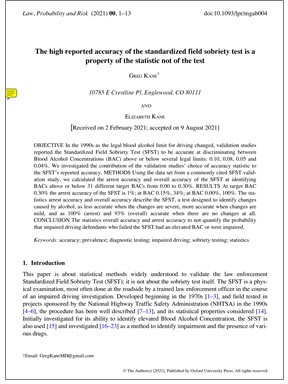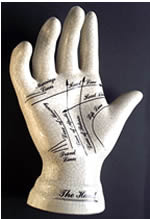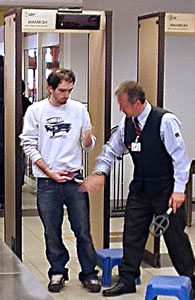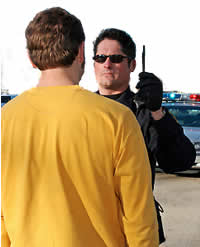
 Download: Kane G, Kane E. The High Reported Accuracy Of The Standardized Field Sobriety Test Is A Property Of The Statistic, Not Of The Test. Law, Probability and Risk, 29 November 2021 Download: Kane G, Kane E. The High Reported Accuracy Of The Standardized Field Sobriety Test Is A Property Of The Statistic, Not Of The Test. Law, Probability and Risk, 29 November 2021Or access at the journal: https://doi.org/10.1093/lpr/mgab004 At a BAC cutoff of 0.08%, the Likelihood Ratio of the SFST is 1.4. |
Your Best Source for SFST Science.. Given that our driver failed the scientific SFST, what is the probability she was impaired by alcohol? DRE officers are trained to testify "93%." Or 91%, or 95%. Those are the SFST accuracies reported in NHTSA's scientific SFST validation studies. They all sound pretty good, which is why defense attorneys don't ask officers the accuracy question. Here's the plot line for this entire web site: Those 90-something percent accuracies do not answer our question. I'm not going to teach you to prove the lady's SFST doesn't count because her shoes were pointy or the officer waved the HGN pen left before he waved it right. This site isn't about how SFST measurements are made. This site is about what SFST measurements mean. The driver failed the SFST test. What does that tell us about her? Most folks find this surprising. It is counterintuitive. Over and over scientific research discovered the accuracy of the SFST is 91 to 95%, so why isn't the accuracy of the SFST administered to our defendant 91 to 95%? The quick answer is "accuracy" is more complicated than you think. NHTSA'S "accuracy" statistic is internally valid to the studies, but not externally valid to our case. The longer answer is what this web site is about.Why Accuracy? The simple and obvious answer is to consider the accuracy of the test. If research scientists did the SFST over and over and found that the SFST gave the correct answer 95% of the time we'll probably rely on it. If they found it was correct 5% of the time, we probably won't. Simple? Simple. Simple, but it doesn't work. This is one of those times the simple and obvious answer is wrong. It turns out:
So what?
As far as the science goes, accuracy of our lady's SFST could by anything. Or nothing. The SFSTs used by US law enforcement are accurate in the same way that astrology, phrenology and palm reading are accurate. They vaguely make sense, and everyone who relies on them seems to think they work. |
|
||||||
|
Everyone with a gun sets off the metal detector, but most people who set off the metal detector do not have a gun. When travelers set off a metal detector, we don't arrest and convict them of gun smuggling and terrorism. Everyone with a gun sets off the metal detector, but most people who set off the metal detector do not have a gun. Metal detectors are highly accurate at spotting people who do have a gun, but they are not especially good at telling the difference between gun and no-gun. On innocent people metal detectors often give the wrong answer. They ring for keys and phones and belt buckles, for lots of stuff. Everybody who is drunk is uncoordinated, but most people who are uncoordinated are not drunk. SFSTs work the same way. It is true that everyone who is drunk is uncoordinated. But it is not true that everyone who is uncoordinated is drunk. If you arrest people for being uncoordinated, you'll end up arresting, and convicting, lots of people who are innocent. |
||||||
|
|
This web site is about science—
NHTSA's SFST validation science. I do not know, I do not care, I
do not have an opinion about Dr. Jack Stuster's knowledge or intentions
at any time ever in his life. I'm not even saying he had knowledge
or intentions. But if he did, this web site isn't about them. Or him.
|
.




